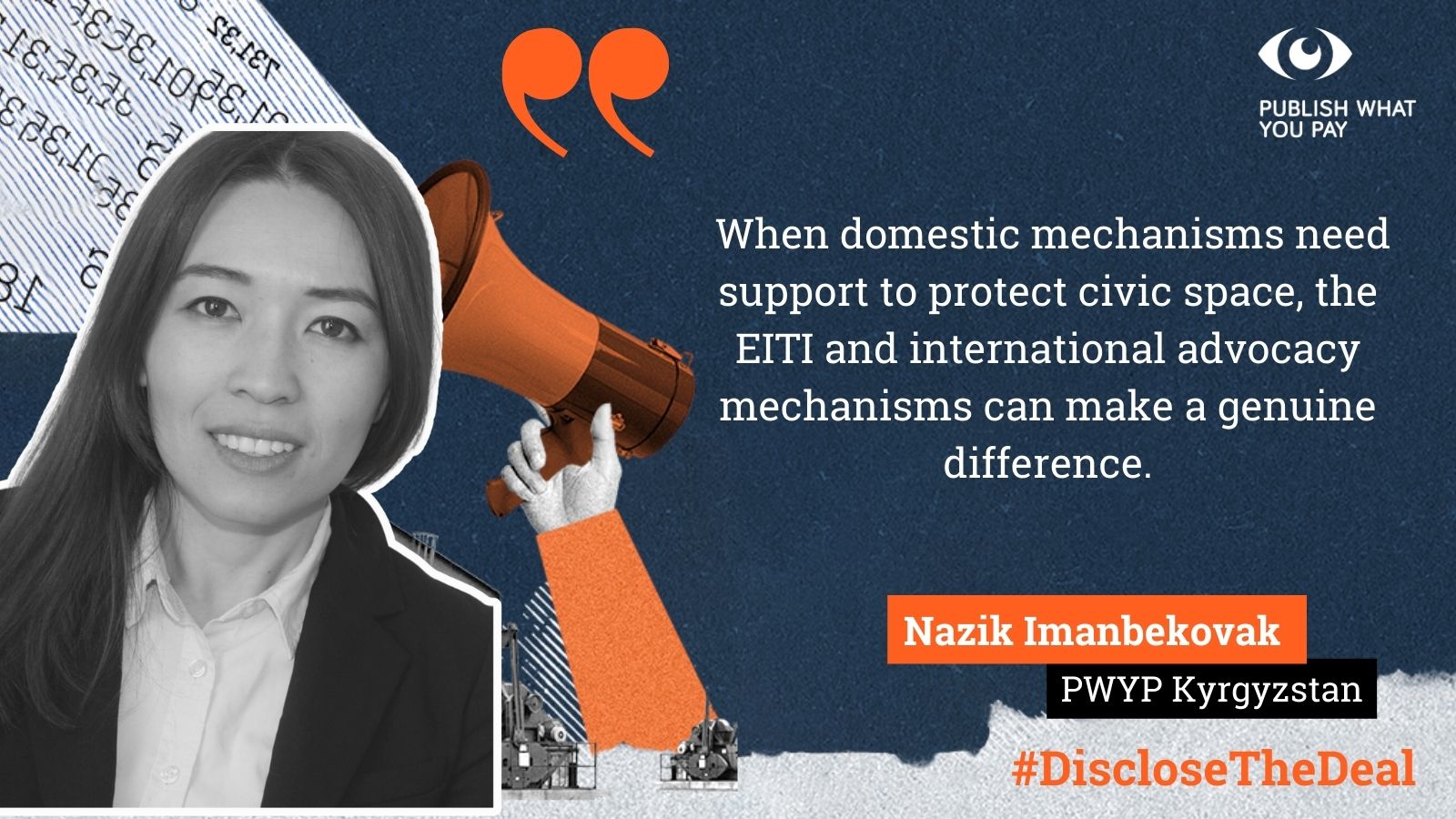Harnessing evidence and international support to uphold civic space in the Kyrgyz Republic
Blogs and News

By gathering evidence about shrinking civic space and drawing on the Extractive Industries Transparency Initiative (EITI) as an effective platform to raise concerns, a diverse national and international movement helped protect civic space in the Kyrgyz Republic – sending a powerful message to governments worldwide. PWYP coalition member Nazik Imanbekova describes their shared achievements.
In 2023, there was a growing sense of alarm among civil society, the media and extractive-sector activists in the Kyrgyz Republic. Since political upheaval in 2020, the country’s civil society and the media have faced increasing constraints. Ahead of its latest EITI Validation, there was a risk that government repression would prevent EITI assessors from understanding the true threat to civic space. In response, a national movement grew – and gained international support – to prevent that from happening.
An EITI member since 2011, the Kyrgyz Republic relies on mining for 10 per cent of GDP. The industry affects many people, but activists in the sector had begun to self-censor, wary of speaking out over issues such as community rights or environmental concerns. The current regime has imprisoned opponents and journalists for exposing fresh corruption cases or questioning government actions. Local and international media are curtailed, and new legislation restricts opposition voices across society.
Inspired by PWYP Philippines, we decided to produce a shadow EITI report to profile the country’s shrinking civic space.
Ensuring meaningful EITI Validation
To include diverse perspectives, we began stakeholder interviews in January 2023, both face-to-face and online. We spoke with members of the Kyrgyz EITI multi-stakeholder group (MSG), civil society, government agencies, mining companies, sector experts and PWYP members. We also reviewed legal context reports from national organisations. Most respondents believed that Kyrgyz civic space is gradually diminishing, sharing personal experiences. One interviewee closed his NGO after financial reforms and increasing pressure on what the government deemed ‘inconvenient organisations’. Others noted the EITI’s potential to address these issues, recalling past effective collaboration among civil society, companies, and the government for a transparent mining sector before political changes and the pandemic.
Our report outlined evidence-based recommendations for EITI stakeholders to strengthen civic space. These included training to promote meaningful civil society participation in EITI processes, and establishing platforms for effective interaction and conflict resolution among local stakeholders.
In May 2023, we released the report and shared it with the EITI International Secretariat. This enabled us to advocate for the EITI Validation to include recommendations to improve civic space.
The Validation Committee used the report to shape its assessment, giving the Kyrgyz Republic a “fairly low score” for EITI implementation and agreeing with our recommendation to set corrective actions. These include preventing restrictions on civic space, and assessing legislative and regulatory requirements impacts on CSOs, to ensure civil society can participate freely and effectively in the EITI.
Shaping the legal environment
The shadow report strengthened civil society within the country’s EITI mechanism, but it also went further than envisaged, providing an invaluable tool to address a parallel concern.
The government had amended its old law which impacts NGOs, entitled the Foreign Agents Bill1 , with provisions that would restrict opposition voices among political parties, NGOs, professional associations, unions, religious organisations and the media. While Parliament passed the initial readings, activists from across these groups joined together to oppose it, and we used the report to build support internationally.
Together, PWYP and the EITI International Board developed an evidence-based advocacy campaign against the repressive terms of the Bill, including strict prison sentences and fines for violations. The EU, US and various European embassies supported us, and the Chair of the EITI Board, Helen Clark, wrote to the government highlighting concerns over the draft law’s negative impact on civic space. With this backing, national NGOs felt able to speak out in the media, adding legitimacy to global voices. The government relented, removing the harsher penalties from the law.
MSG members are now working on delivering the EITI’s corrective actions, before an interim targeted Validation in 2024, triggered by the country’s low score. Although the corrective actions did not refer to the Foreign Agents Act specifically, they clearly required that the MSG assess its potential impact on civil society. This requirement creates a formal channel for scrutiny now and in the future, allowing civil society and our allies to raise the alarm if necessary.
Key lessons: evidence and EITI impact
The joint achievements of our movement confirmed this as a highly effective approach, which we would take again and could prove helpful in similar contexts.
Our key learnings:
- Evidence as a Tool: Sound evidence is crucial in upholding civic freedoms and influencing validation processes.
- National and international support: Beyond shaping the validation process, the shadow report helped build broad national and international support in defence of civic space, and will also shape future MSG discussions
- EITI’s Role: When domestic mechanisms need support to protect civic space, the EITI and international advocacy mechanisms can make a genuine difference. The EITI was an essential platform for our report, which would otherwise have been invisible beyond the validation process.
Although civil society remains under pressure, these changes are significant for our country, our region and EITI members worldwide, signalling clearly that leaders must uphold civic space and allow everyone’s voice to be heard across society.
1 The official name of the bill is “The draft law “On amendments to certain legislative acts of the Kyrgyz Republic (Law of the Kyrgyz Republic “On non-profit organisations” branches (representative offices) and to the Criminal Code of the Kyrgyz Republic)” , the government amended the law and included articles on “foreign representatives”. ‘Foreign Agents’ Law is the name given to the law by the media.










